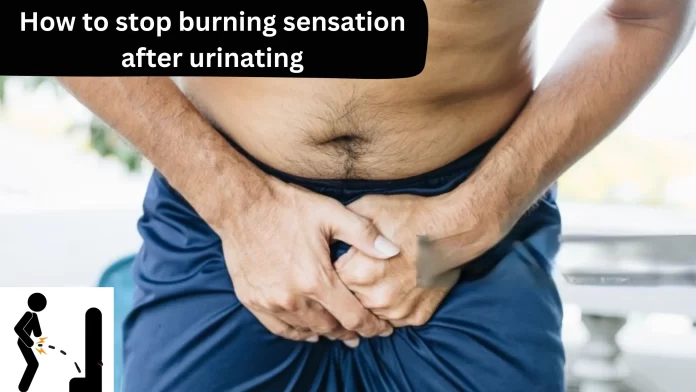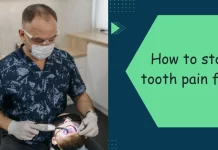Burning sensation after urinating, also known as dysuria, can be an uncomfortable and distressing experience for many individuals. This common problem can be caused by various factors, ranging from urinary tract infections to dehydration. In this article, we will explore how to stop burning sensation after urinating its causes, symptoms, and effective ways to manage and prevent the burning sensation after urination, ensuring that you can regain your comfort and maintain optimal urinary health.
Table of Contents
What causes a burning sensation after urination?
Knowing factors of how to stop burning sensation after urinating can be helpful, some of which include:
Urinary tract infections (UTIs): Infections in the bladder, urethra, or kidneys can cause inflammation, leading to painful or burning urination. UTIs are typically caused by bacteria, most commonly Escherichia coli (E. coli).
Sexually transmitted infections (STIs): Some STIs, such as chlamydia, gonorrhea, and herpes, can cause inflammation and irritation in the urinary tract, resulting in a burning sensation during or after urination.
Interstitial cystitis (IC): Also known as painful bladder syndrome, IC is a chronic condition characterized by bladder inflammation and pain, which can cause burning sensations during and after urination.
Kidney stones: These are mineral deposits that can form in the kidneys and sometimes travel down the urinary tract. When passing a kidney stone, individuals may experience severe pain and a burning sensation during urination.
Dehydration: Insufficient fluid intake can lead to concentrated urine, which may cause irritation and a burning sensation in the urethra.
Urethral stricture: A narrowing of the urethra due to scarring or inflammation can cause painful urination and a burning sensation.
Prostatitis: Inflammation of the prostate gland can cause painful or burning urination in men.
Vaginitis: Inflammation or infection of the vagina, often caused by yeast infections or bacterial vaginosis, can lead to a burning sensation during or after urination in women.
Chemical irritants: Soaps, bubble baths, detergents, or other personal hygiene products can cause irritation in the genital area, leading to a burning sensation during or after urination.
Certain medications: Some medications, such as chemotherapy drugs, can cause a burning sensation during urination as a side effect.
How can I relieve the pain and discomfort of dysuria?
Get relieve the pain and discomfort associated with dysuria. Consider the following tips and remedies for how to stop burning sensation after urinating:
Drink plenty of water
Staying well-hydrated can help dilute your urine, reducing irritation and potentially alleviating the burning sensation.
Use over-the-counter pain relief
Non-prescription pain relievers like ibuprofen or acetaminophen can help manage pain and discomfort temporarily. Remember to follow the recommended dosages and consult a healthcare professional if symptoms persist.
Apply a warm compress
Gently applying a warm compress to the lower abdomen or genital area can help soothe the pain and discomfort associated with dysuria.
Avoid irritants
Burning sensation can also be caused due to use of soaps. So to know how to stop burning sensation after urinating, stay away from harsh soaps, bubble baths, and other personal hygiene products that may cause irritation. Opt for fragrance-free and hypoallergenic alternatives instead.
Take a sitz bath
Soaking in a warm sitz bath for 15-20 minutes can help alleviate discomfort and promote relaxation.
Avoid caffeine, alcohol, and spicy foods
These substances can irritate the urinary tract and worsen dysuria symptoms. Limit your intake until symptoms improve.
Wear loose, breathable clothing
Tight or non-breathable clothing can exacerbate irritation and discomfort. Opt for loose, cotton garments to promote air circulation and minimize friction in order to know how to stop burning sensation after urinating.
Empty your bladder completely
Ensure that you completely empty your bladder when urinating, as residual urine can aggravate symptoms and promote bacterial growth.
Urinate frequently
Avoid holding in your urine for extended periods, as this can cause further irritation and discomfort.
Seek medical treatment
If the burning sensation is due to an infection, such as a UTI or STI, consult a healthcare professional for appropriate diagnosis and treatment. Antibiotics or antiviral medications may be prescribed to treat the underlying infection.
What are the symptoms of a urinary tract infection (UTI)?
Urinary tract infections (UTIs) are common infections that occur when bacteria, most commonly Escherichia coli (E. coli), enter and multiply in the urinary tract. The symptoms of a UTI can vary depending on which part of the urinary tract is affected – the kidneys, bladder, or urethra. Here are some common symptoms of a UTI:
- A strong, persistent urge to urinate
- A burning sensation during urination (dysuria)
- Passing frequent, small amounts of urine
- Cloudy, dark, bloody, or strong-smelling urine
- Pain or pressure in the lower abdomen or back
- Feeling tired or shaky
- Low-grade fever (more common with kidney infections)
In the case of a kidney infection, which is a more severe type of UTI, additional symptoms may include:
- High fever
- Chills
- Nausea and vomiting
- Severe back, side, or groin pain
- Confusion or disorientation (especially in older adults)
How to stop burning sensation after urinating home remedies?
When you are facing such burning sensation while urinating chances are there you either have urinary tract infection or there could be other kidney diseases such as urethral stricture, prostatitis or even painful bladder syndrome. If your medical issue has been diagnosed and you are under medication – then along with that, here are some home remedies that you may try. Also, in case your issue has not been detected – then you may try these in the meantime.
Before you proceed with the processes of how to stop burning sensation after urinating- have a quick look at what you will need to add to your diet – extra water consumption along with fluids (fresh fruit juices), probiotics, Vitamin C and other supplements, unsweetened cranberry juice and apart from that you must watch your hygiene.
Home remedies to try –
- Increase fluid intake – Dehydration is directly linked to increased chances of UTI as per multiple studies. Therefore, you must increase your water intake and ensure that rather than packaged fruit juices you try having more fresh fruit juices. When you drink more fluids, you urinate more, and thereby remove the bacteria from your body.
- Higher Vitamin C consumption – One of the best home remedies for treating burning sensation while urination is – increasing the Vitamin C content in your body. For this you may directly consume fruits (grapefruit, kiwi, and oranges) or have gummies or tablets laden with Vitamin C. There are a number of Vitamin C pouches available that you can also consume.
- Natural supplements – Apart from Vitamin C, you must also consume other supplements such as – cranberry, garlic and D-mannose supplements that safeguard your body from a host of urinary infections.
- Unsweetened cranberry juice – This is supremely beneficial for treating burning sensation during urination or treating UTIs. however, you must not have a sweetened juice since that harms the body more. If unavailable – try cranberry capsules.
- Probiotics – These are microorganisms that benefit the gut bacteria in the body. In the process, this also helps control UTI and better your neural health.
See also Top 5 Fitness Myths That It’s Time to Overcome
Lastly, you must exercise caution and ensure to follow proper hygiene to prevent UTIs in the future.
How long does it take for the burning sensation to go away?
The duration it takes for the burning sensation after urination to go away largely depends on the underlying cause and the effectiveness of the treatment administered. In general, you can expect the following timelines:
Urinary tract infections (UTIs)
With appropriate antibiotic treatment, symptoms usually improve within a few days, although it’s crucial to complete the full course of antibiotics as prescribed by your healthcare professional to ensure the infection is fully resolved.
Sexually transmitted infections (STIs)
The duration varies depending on the specific STI and the treatment plan. Some infections, such as chlamydia and gonorrhoea, can be resolved within a week or two with proper antibiotic treatment. Others, like herpes, may require ongoing antiviral medication to manage outbreaks, and the burning sensation may reoccur during future outbreaks.
Interstitial cystitis (IC) or other chronic conditions
As these are long-term conditions, the burning sensation may not go away completely, but can be managed through lifestyle changes, medications, and other treatment options.
Dehydration
Once you increase your fluid intake and become adequately hydrated, the burning sensation may subside within a day or two.
Chemical irritants
Avoiding the irritant and giving your body time to heal should lead to symptom relief within a few days.
Continual burning after urination female
If you are constantly having a burning sensation after urinating, then it is time to visit a doctor. In most cases, this happens due to a urinary tract infection and the chances of a woman getting one in her lifetime is almost 40-50%. Are you constantly facing this issue? Then the first thing that you will have to remember is to get yourself checked. After that – do not forget your medicines since that is the road to recovery.
Though there are no immediate solutions to this medical issue apart from prolonged treatment, to ease the pain, you must drink lots of water and have fresh fruit juices. During the treatment process, avoid any processed or junk food and preservative packed juice bottles. Also, you will have to cut down on your caffeine content – if not completely but considerably. Alcohol and smoking are a complete no-no since they exacerbate the situation in the long run.
Burning Sensation after Urinating but feel it no infection
It is very common to assume that when you have a burning sensation after urinating, you must have a urinary tract infection. In fact, in most cases even the doctors would agree to the same. However, there are chances that you might have different issues apart from UTI. The other causes are – urethral stricture disease, prostatitis, any other kidney disease or painful bladder syndrome. For the record – UTI is caused by bacteria, while the other issues happen due to a variety of factors.
If you are diagnosed with urethral stricture disease, then you are facing a blockage of your urethra. This can be due to STI, damage to urethra, swelling or any other surgical process. In case of painful bladder syndrome – the clear cause cannot be determined. Apart from the above-mentioned issues, you can also face this burning sensation due to kidney stones, or even prostatitis. Most of these are treatable and you need not be worried.
Frequently Asked Questions
Q1: Can certain medications cause dysuria?
Ans: Some medications, such as chemotherapy drugs, can cause a burning sensation during urination as a side effect.
Q2: Are there any over-the-counter treatments for dysuria?
Ans: Over-the-counter pain relievers like ibuprofen or acetaminophen can temporarily help manage pain and discomfort.
Q3: How can I prevent burning after urination?
Ans: Maintain proper hydration, practise good hygiene, avoid irritants, and seek medical treatment for infections.
Q4: Can UTIs recur after treatment?
Ans: UTIs can recur, even after treatment. To reduce the risk, practise good hygiene and follow the prescribed treatment plan.
Q5: When should I see a doctor for a burning sensation after urinating?
Ans: If the burning sensation persists, worsens, or is accompanied by other symptoms like fever, seek medical attention.






















